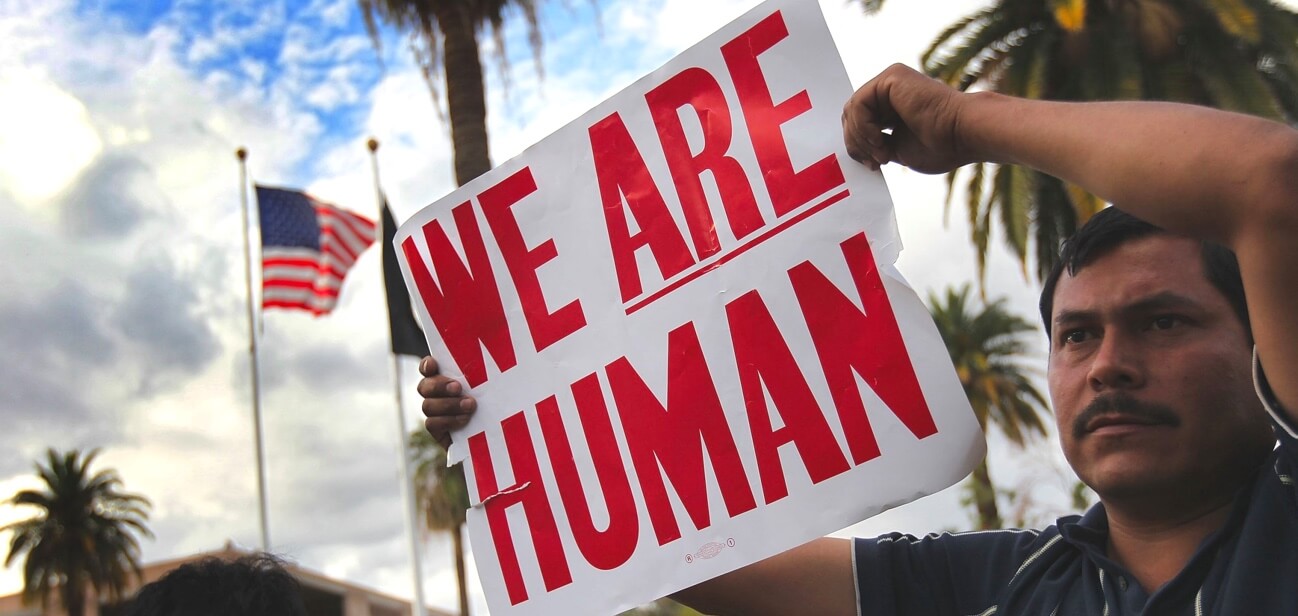Arizona
Appeals to the
Supreme Court


U.S. Supreme Court justices hear arguments for or against SB1070 in United States v. Arizona.
Arizona appeals to the Supreme Court, arguing that that the 9th Circuit’s decision in United States v. Arizona “turns well-established principles of federalism and facial challenges upside down,” and that on the contrary, federal immigration laws “expressly contemplate” cooperation between the states. Arizona insists that the U.S. Supreme Court already rejected the argument that states play no role whatsoever in enforcing federal immigration laws, citing the court’s decision in another landmark case upholding the state’s ability to pull the licenses of businesses that employ illegal aliens. The 9th Circuit upholds Judge Bolton’s decision in United States v. Arizona. In his concurring opinion, Appellate Court Judge John Noonan wrote that the law has “become a symbol. For those sympathetic to immigrants to the United States, it is a challenge and a chilling foretaste of what other states might attempt. For those burdened by unlawful immigration, it suggests how a state could tackle that problem.” Noonan concluded that SB1070 has the “potential to lead to 50 different state immigration schemes piling on top of the federal scheme.”
If provisions of SB 1070 are found to be preempted under federal law, identical provisions of other state laws will also be prevented from going into effect.
Story info:
Author Nameickus
ALL BASED
ON RESONABLE
SUSPICSION
The federal government filed suit against the state of Arizona not long after SB 1070 was signed into law April 23, 2010

Info about this photo goes in this sentence here, maybe even two to three lines could go in this area right here possibly if needed. Could even possibly more than that, like a small pdescription paragraph or something like that.
Arizona appeals to the Supreme Court, arguing that that the 9th Circuit’s decision in United States v. Arizona “turns well-established principles of federalism and facial challenges upside down,” and that on the contrary, federal immigration laws “expressly contemplate” cooperation between the states. Arizona insists that the U.S. Supreme Court already rejected the argument that states play no role whatsoever in enforcing federal immigration laws, citing the court’s decision in another landmark case upholding the state’s ability to pull the licenses of businesses that employ illegal aliens. The 9th Circuit upholds Judge Bolton’s decision in United States v. Arizona. In his concurring opinion, Appellate Court Judge John Noonan wrote that the law has “become a symbol. For those sympathetic to immigrants to the United States, it is a challenge and a chilling foretaste of what other states might attempt. For those burdened by unlawful immigration, it suggests how a state could tackle that problem.” Noonan concluded that SB1070 has the “potential to lead to 50 different state immigration schemes piling on top of the federal scheme.”
If provisions of SB 1070 are found to be preempted under federal law, identical provisions of other state laws will also be prevented from going into effect.
Arizona appeals to the Supreme Court, arguing that that the 9th Circuit’s decision in United States v. Arizona “turns well-established principles of federalism and facial challenges upside down,” and that on the contrary, federal immigration laws “expressly contemplate” cooperation between the states.
Arizona appeals to the Supreme Court, arguing that that the 9th Circuit’s decision in United States v. Arizona “turns well-established principles of federalism and facial challenges upside down,” and that on the contrary, federal immigration laws “expressly contemplate” cooperation between the states. Arizona insists that the U.S. Supreme Court already rejected the argument that states play no role whatsoever in enforcing federal immigration laws, citing the court’s decision in another landmark case upholding the state’s ability to pull the licenses of businesses that employ illegal aliens. The 9th Circuit upholds Judge Bolton’s decision in United States v. Arizona. In his concurring opinion, Appellate Court Judge John Noonan wrote that the law has “become a symbol. For those sympathetic to immigrants to the United States, it is a challenge and a chilling foretaste of what other states might attempt. For those burdened by unlawful immigration, it suggests how a state could tackle that problem.” Noonan concluded that SB1070 has the “potential to lead to 50 different state immigration schemes piling on top of the federal scheme.”

The Future
Arizona Appeals to
The Supreme Court
Arizona appeals to the Supreme Court, arguing that that the 9th Circuit’s decision in United States v. Arizona “turns well-established principles of federalism and facial challenges upside down,” and that on the contrary, federal immigration laws “expressly contemplate” cooperation between the states.
Read the full story